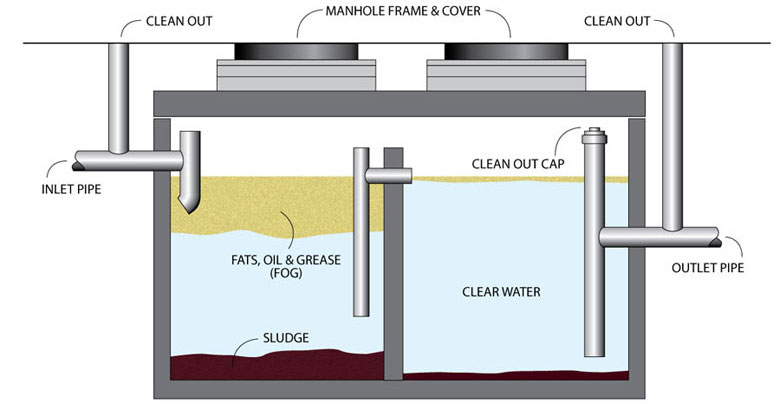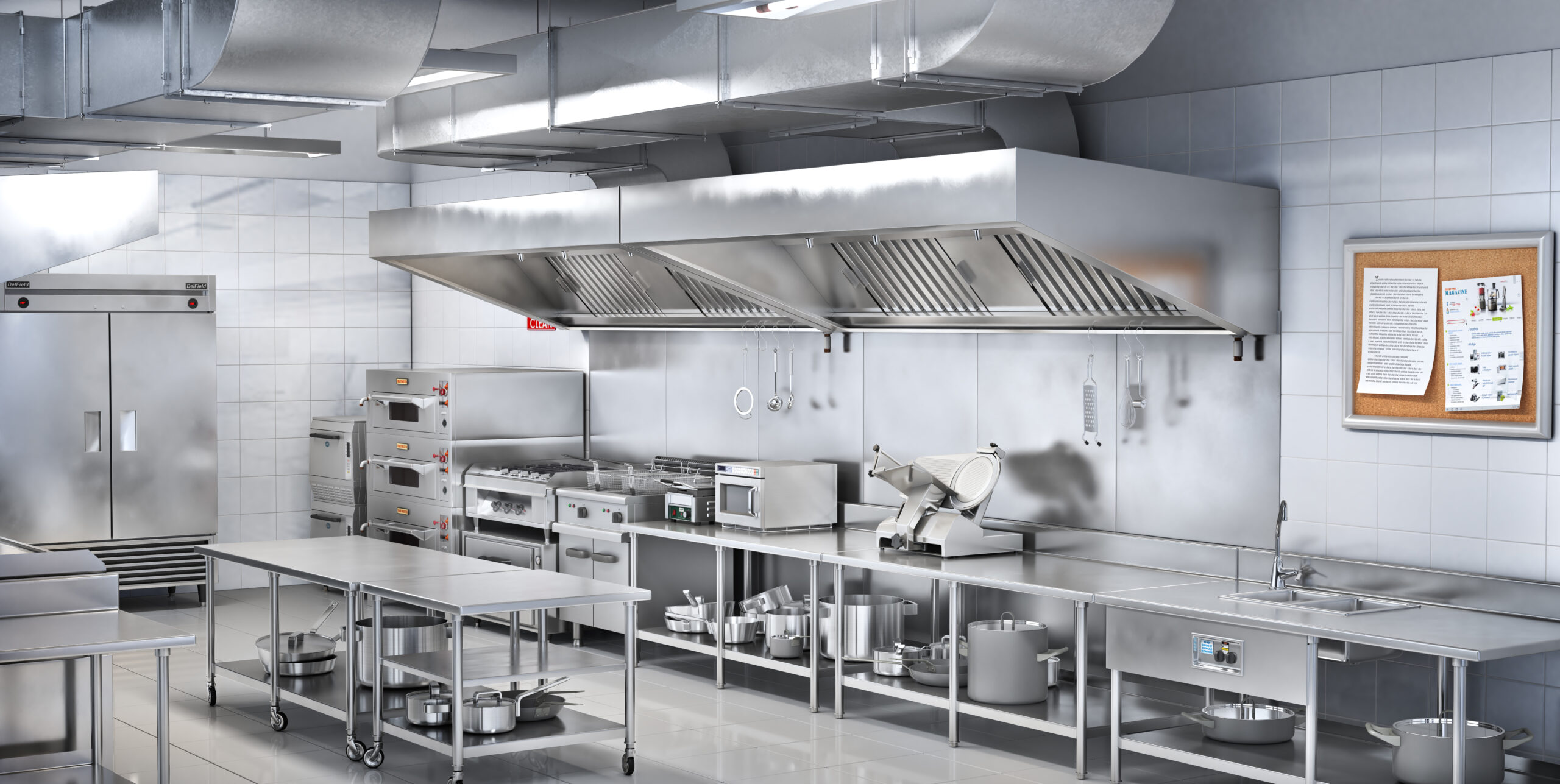There are numerous potential issues that can disrupt the operations of restaurants and food service establishments, but few are as troublesome as a plumbing emergency that causes a backup. Backups of sinks, floor drains, and restrooms can cause significant property damage and pose serious health risks, especially if the water is contaminated with grease, sewage, or other waste materials. Such incidents result in costly repairs and interruptions to your business that can cause a loss in revenue.
Knowing what to do when a backup occurs in your commercial kitchen is crucial for minimizing the damage to your property and the disruption to your business. Backups require immediate attention because the water will continue to spread which can result in significant property damage. The severity of the damage directly impacts your loss of revenue as more extensive damage will be more expensive to repair and could cause significant disruptions to your business. The best way to prevent backups is to take proactive measures, such as fixing problems with drains or the plumbing system as soon as you notice them and keeping up with grease trap cleaning and maintenance.
In this guide, we will discuss the main types of backups that can occur within your commercial kitchen, as well as what to do when they occur and how you can prevent them. Taking the right actions to prevent and respond to backups in your restaurant can help prevent costly damage and loss of revenue.
 Sink Backups
Sink Backups
The sinks are crucial for maintaining the cleanliness of a commercial kitchen and taking care of important tasks like washing dishes. They are also vulnerable to backups that can quickly flood your kitchen. If your sink backs up, follow these steps to unclog the sink before it causes flooding:
- Try to remove the clog by plunging the sink.
- If your sink has more than one basin, have someone cover the drains with rags while you plunge each drain one by one.
- Start by plunging the sink closest to the drain in the wall or floor.
- If you cannot remove the clog by plunging, stop using your sink and call a professional who can remove the clog by rotting or jetting the drain.
You can prevent backups in the sinks in your kitchen with the following tips:
- Use non-removable screens over the sink drains.
- Keep your grease traps clean and maintained to prevent grease and oils from getting into the drains.
Floor Drain Backups
The floor drains in your commercial kitchen are essential for allowing the water to make its way out of your kitchen and into the sewer system. A backup of the floor drain can cause the kitchen floor to flood, and the water may be mixed with fats, oil, and grease (FOG). If one of your floor drains backs up, follow these steps:
- Make sure the backup is only in one of the floor drains.
- Check the lowest drain first, as this is usually the first drain to backup.
- If you have only one drain that is backed up, put a water hose into the drain and turn it on to try to blow through the clog with the water. This could dislodge the buildup.
- When doing this, put towels around the hose while it is in the drain to prevent splashback.
- Instead of using a hose, you can try to plunge the floor drain or dislodge the clog with a hand auger.
- Do not put sticks or poles into the drain because you can damage the bottom of the p-trap and cause a bigger mess.
- If none of these methods remove the clog, call a professional right away to rod or jet the drain.
You can prevent floor drain backups by doing the following:
- Use non-removable screens and small holes so no debris can leave the drain and enter the pipe.
- Have your grease traps cleaned and rodded regularly to prevent debris buildup.
 Backups in All Floor Drains
Backups in All Floor Drains
If all floor drains are backed up, it is most likely due to a problem with your grease traps. Make sure you take the following steps if you have a backup in every floor drain:
- Check your grease trap first to see if it is backing up.
- If the water level in your grease trap is above the outlet fitting, then the outlet pipe is likely clogged and needs to be rodded.
- If this is the case, call a professional to rod the outlet pipe of the grease trap.
The best way to prevent a major problem like this is to work with a professional like Mahoney Environmental to have your grease traps cleaned and maintained on a regular basis. Our professionals will set up regularly scheduled maintenance to ensure that your grease traps are clean and in good repair. Our grease trap maintenance services include rodding and jetting to remove clogs before they can cause a backup.
Restroom Backups
Restroom backups can be dangerous because the water that backs up is usually mixed with waste. The first thing you need to do to address a backup in the restroom is figure out what is backing up. The backup could come from a toilet, sink, or floor drain. The source of the backup will determine your next steps:
- Check the floor drain first and if it is not backing up, then the toilets are the problem. Use a plunger or an auger to remove the clog in the toilet.
- Sinks and urinals need to be rodded if they are backing up. It is best to have a professional rod out clogged restroom sinks and urinals.
- It is possible for a blockage in the main sewer to cause a backup in the restroom. When this happens, call a plumber to deal with the situation.
You can help prevent backups in your restrooms with the following tips:
- Make sure there is a container in the women’s room for feminine hygiene products, so they are not flushed. These products can clog the pipes and cause a backup.
- Use drain covers for the urinals.
- Put non-removable screens on the drains in the restrooms. This will prevent debris from mopping from getting into the drain and eventually causing a backup.
Issues Caused by Backups
No matter what type of backup occurs in your restaurant or food service business, you must clean up the mess and repair the damage as soon as possible. The effects of a backup can be detrimental to your business in the following ways:
- Disruption of operation: A backup in the kitchen can disrupt your operations, which prevents you from being able to serve your customers.
- Health risks: Backups may contain materials like FOG or sewage. Exposure to these materials can put the health of staff and customers at risk.
- Property damage: Water from the backup can flood your restaurant and cause major damage to flooring, furniture, equipment, and electrical systems.
- Expensive repairs: The repairs following a backup can be expensive as they may involve replacing pipes, structural repairs, and cleaning and restoration of the affected areas.
- Reputation damage: Experiencing a backup that disrupts your business can dent customer trust and affect your reputation.
- Revenue loss: Halting business operations when a backup occurs and paying for repairs can cause a significant loss of revenue.
Prevent Plumbing Emergencies with Grease Trap Cleaning Services
Plumbing emergencies like backups can disrupt your food service business, leading to costly damage and even temporary closures. Grease trap backups can cause serious damage and increase the risk of slip and fall injuries. The most effective way to prevent these issues is by partnering with a trusted professional like Mahoney Environmental for regular grease trap cleaning and maintenance.
At Mahoney Environmental, we offer scheduled grease trap services to keep your grease traps clean, functional, and free of clogs or debris. If more serious issues arise, our team is equipped to rod or jet your grease traps to effectively clear blockages and prevent backups. We are also available 24/7 to provide emergency grease trap cleaning and maintenance.
Call Mahoney Environmental at (800) 892-9392 for more information about how our grease trap cleaning and maintenance services can help prevent plumbing emergencies for your restaurant.


 Call Us Now (800) 892-9392
Call Us Now (800) 892-9392